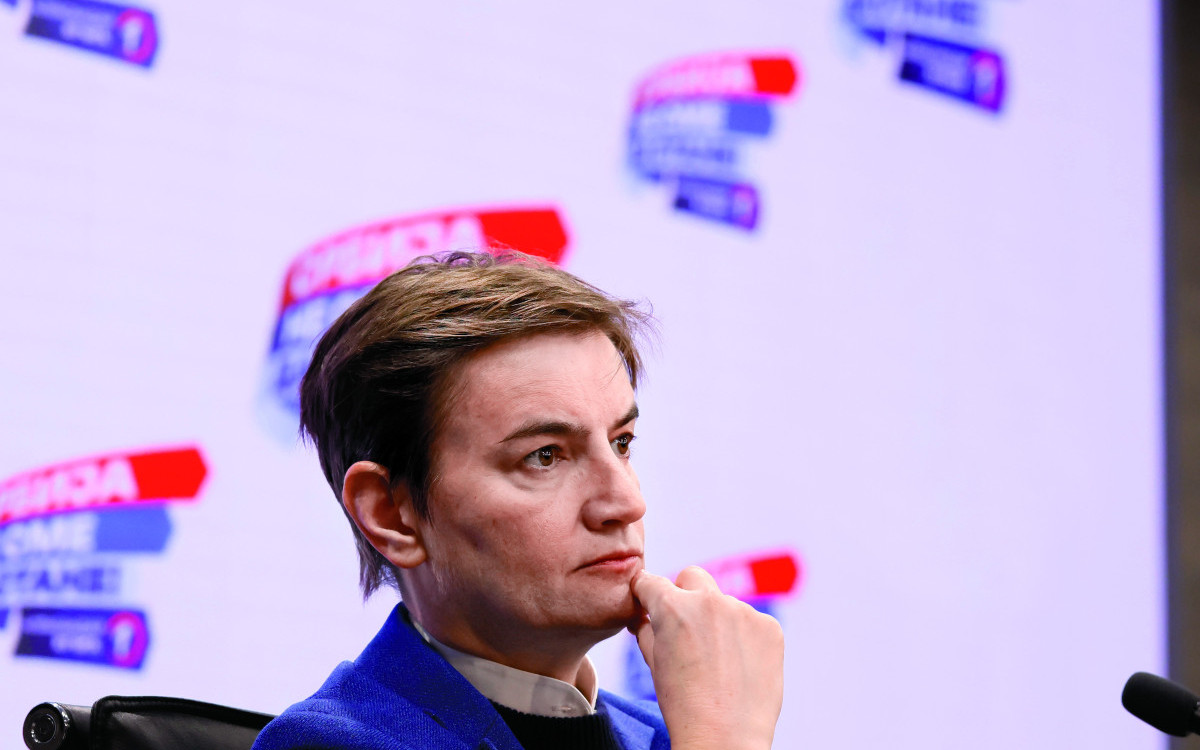
21.03.
2024.
Rise without falls of the departing prime minister: Ana understood how to understand
Now the question arises, what is the essence of the next phase of Ana Brnabić's political career.
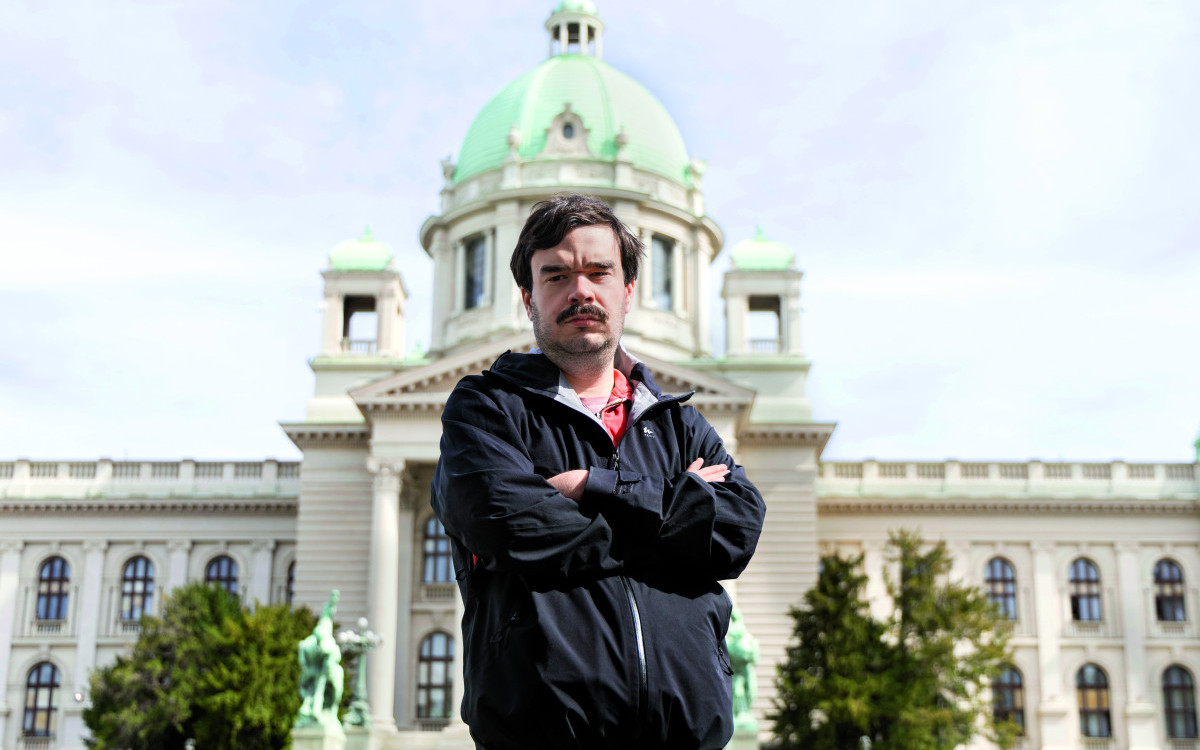
Bewildered, rigid, and sometimes alarmed, Marko Milošević sits silently in the parliamentary bench of the Socialist Party of Serbia (SPS), most of the time with his gaze directed straight ahead, glancing occasionally left and right at what is happening.

21.03.
2024.
Now the question arises, what is the essence of the next phase of Ana Brnabić's political career.
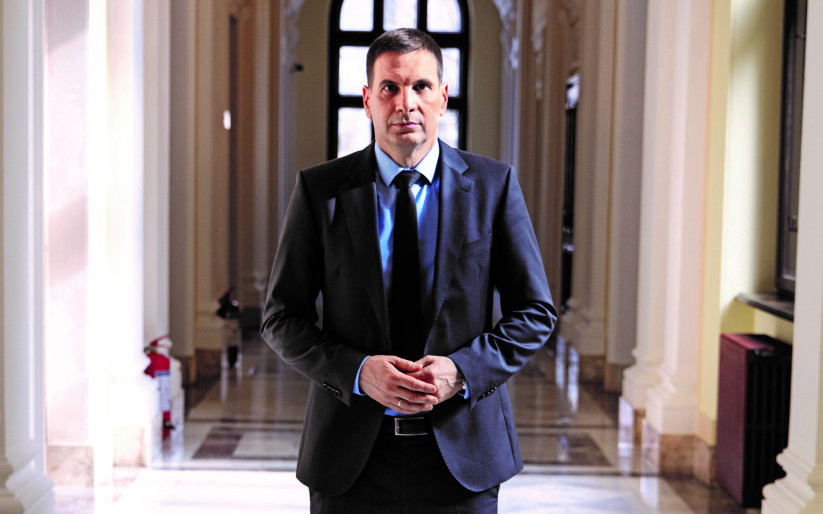
21.03.
2024.
We need to decide whether we should participate at all, because “if the elections are not fair, they should not be held at all”.
“Descendants do not inherit the crime of their ancestors,” Uroš Stambolić, the grandson of Ivan Stambolić, told NIN, adding immediately:
“Not if they renounce the evil politics of the ancestor.”
If they renounce it, like, for example, Reiner Hoess, the grandson of the commander of Auschwitz, who was symbolically adopted by Eva Mozes Kor, a survivor of this concentration camp, 70 years after her ordeal. The grandson of Auschwitz commander Rudolf Hoess did not even know who his grandfather was. His family kept the truth from him. After he learned the truth, he spoke so strongly about the Holocaust and the Nazi crimes that his relatives, who live quietly in the vicinity of Auschwitz without condemning the crimes, disowned him.
Marko Milošević bowed before his grandfather’s legacy. No, he did not condemn him.
“For me, this idea is eternal”, he said. “All I know about my grandfather is what my mother told me,” he added. That explains a lot.
Where the socialists feel at home and praise Putin as if he were Milošević himself.
Milošević’s grandson Marko Junior, however, lives between Belgrade and Požarevac and visits his father in the Russian capital only in the summer. But his new SPS membership card, received on the 33rd anniversary of the party, is what now ties him to Moscow politically as well, because the party has solid connections there. Too much Russia, don’t you think?
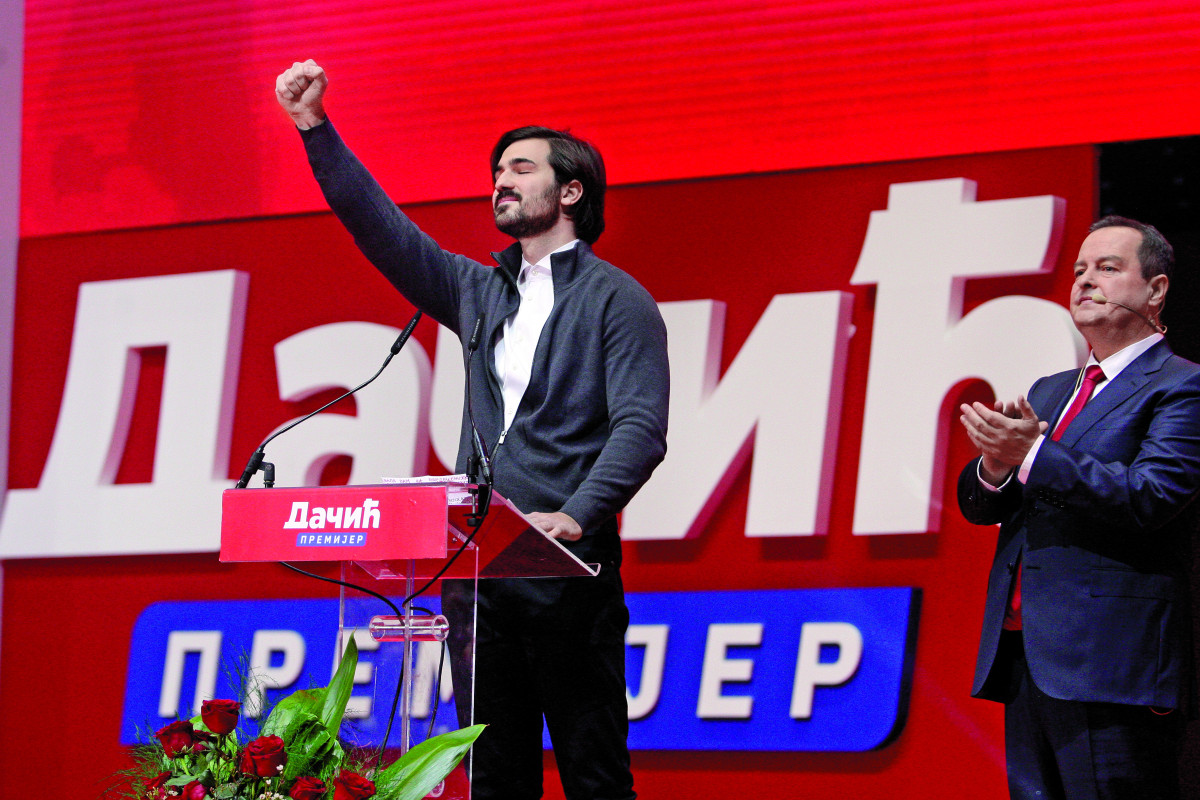
By accepting his grandfather’s party’s membership card, Marko Milošević also accepted the difficult legacy of his grandfather’s regime. Including the murder of his best friend from university days, Ivan Stambolić.
“The drawstring from Ivan Stambolić’s sweatpants was the first thing we found. Immediately after that, the skull appeared. The pit, 90cm x 60cm in size. The body covered with lime. Keys to his apartment in the pocket. A part of the skeleton and the right leg with the sneaker was all that was left of him. Everything else was burned and destroyed by lime. Two small-caliber projectiles were found in the skull, the holes were barely visible,” it is stated in the expert’s report on Stambolić’s body, found during the Serbian police operation “Sabre”. The court verdict states that the motive for the murder was the fear of the Milošević couple that Stambolić would run for president in the upcoming 2000 elections. Attorney Radoje Stefanović, who had been an associate of both of them for decades, said: “The elections were scheduled for September 24th 2000, and Stambolić was kidnapped on August 25th that year”.
What could Marko Milošević, a 24-year-old quiet and well-behaved young man, have to do with that? Actually, nothing. For him, all the people in the Assembly hall are complete strangers. He has never had any contact with his grandfather other than in The Hague, let alone with his grandfather’s “colleagues”.
“I don’t know any of them except Ivica Dačić, and I’m friends with his son Luka, who is a great guy”, said Marko Milošević in an interview.
On the National Assembly website, it is stated that he is a doctoral student at the Faculty of Law in Belgrade. When he was still in the Požarevac High School, as one of its best students, he said that he would never be involved in politics because it had caused a lot of harm to his family.
What does Uroš Stambolić think and how is his family coping with the harm done to them by Milošević?
“It is a personal matter, I would not want to share it with the public,” Uroš Stambolić told NIN.
Without any drama or emotion in his voice, Uroš Stambolić says: “I did not take any closer look at the behavior of Marko Milošević in the parliament. His being an MP does not affect me. I don’t take it personally because the children do not inherit the accountability of their ancestors,” he notes.
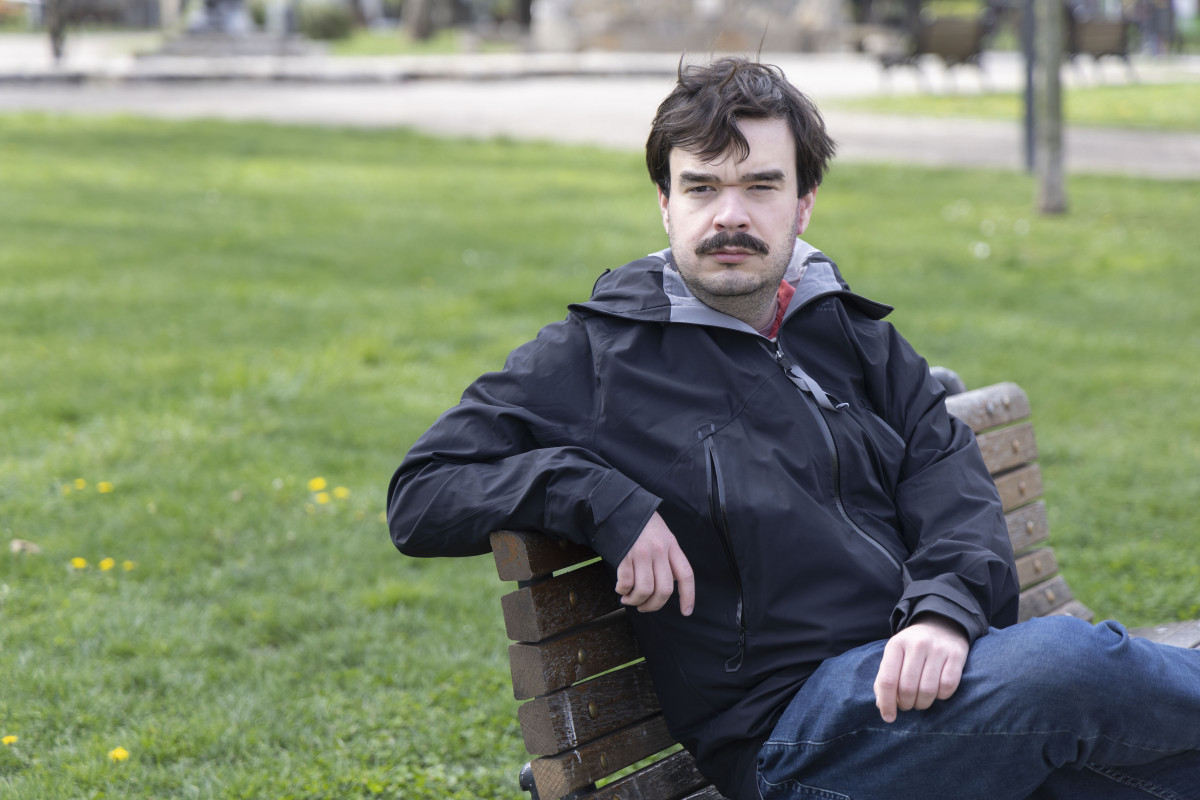
On the other hand, he adds that it is true that the fact that Marko Milošević is an MP from the ranks of SPS means that he represents the politics that caused everything that happened in the 1990’s.
As a leftist, Uroš Stambolić is engaged in activism, through the organization “The Roof Over Our Heads” (“Krov nad glavom”); he is one of the organizers of the protest “Against the Dictatorship” (“Protiv diktature”). However, unlike Milošević’s grandson, politics is not his choice. Instead of the parliament, when he has some free time, as he told NIN, he likes to spend it outdoors, travelling around Serbia, visiting film festivals, various events and tasting traditional foods in different parts of our country. The one thing that he condemns Marko Milošević for is that he did not distance himself from the politics of his grandfather.
“Milošević was a criminal and his grandson should be aware of what his involvement in politics symbolizes. Even though he cannot be guilty for his grandfather’s crimes simply because he is his grandson, he has an even greater responsibility to fight against the glorification of Slobodan Milošević. Sloba is his grandfather and he is being presented in public as Milošević’s grandson, and not as an independent person with merits of his own. Since he is not doing it, not distancing himself from that politics, it is clear that both he and the SPS are looking to glorify Sloba. It is not unexpected in a country that continues to slide to the right, where the cult of personality is increasingly rising in power. Politics is almost non-existent in this country, it is simply a décor for a personality cult and serves to make some individuals rich while the neglected people struggle with real poverty, and their attention is diverted with nationalism,” says Uroš.
There is nothing more to say about the fate of his grandfather Ivan, he says. Ivan Stambolić himself talked about how the birth of Uroš brought great joy to his gloomy life, because he believed that Milošević was responsible for the death of his daughter Bojana. He received numerous letters, allegedly from the State Security Directorate (DB), stating that she paid for her father’s political engagement with her life, when she was only 24.
In his last interview, Stambolić said that he felt joy every time he looked at his three-year-old grandson Uroš.
Today, Uroš says that his only memory of his grandfather is him painting his face like an Indian.
“Later, I interpreted it as a lesson that one should always take the side of the oppressed. I also remember him struggling to fish out a toy that I kept pushing into a hole in the armchair. He was the only one patient enough to do it and for me it was very amusing. What I learnt from that is that you have to try hard and be patient for the people you love,” says Uroš.
The society that the grandson of Ivan Stambolić would like to live in and for which he is fighting as an activist is the one where people strive to distribute the existing goods evenly and where the majority is not terrorizing the minority.
“We must put an end to this abnormal grabbing of wealth so the rest of the people could live decently. People should be prepared to listen and understand the views of others, instead of immediately condemning and judging them based on where they are coming from. This largely applies to both the government and the opposition in Serbia,” he points out.
Stambolić’s grandson took part in the protests of April 2017 because they were not organized by any political party and because they were developing in the direction of, as he saw it, demands relating primarily to the existential issues of social justice. He is convinced that there are no politicians in Serbia today, but only interest groups and individuals who work for themselves, without ideas and without regard for others.
Žarko Korać, a former deputy of Prime Minister Đinđić who served three terms as an MP in the Serbian parliament since 1993, says for NIN that Milošević’s grandson cannot be held accountable for his grandfather’s actions, but that the problem is that he has become an MP only because of his family name.
“It is disrespectful, cynical and offensive to use that family name to get votes and to reaffirm the politics that led to the demise of Serbia and the death of more than 150,000 people. Unscrupulous and appalling”, says Korać.
Unlike his father, who formally only attended a private school, Marko Junior was the best student of the Požarevac High School. He says that people often keep their distance from him at first, but when they get to know him, they realize that he is neither arrogant, nor rude. When they ask him if he likes driving fast, and everything that goes with it, like his father, he says that he is moderate in everything and that on the contrary, he is not a big fan of driving and that he drives slowly and carefully. He doesn’t listen to the “turbo folk”, first launched in his father’s club in the 1990’s, but rather rap music, and the Požarevac DJ Neba is his best friend.
But, the time has come for politics to grab him. “Little Marko has grown up”, one of the highest SPS officials Aleksandar Antić told the Belgrade media when Marko was seen in public for the first time, at a pre-election convention of the Socialists in the Belgrade Arena, accompanied by his mother Milica Gajić. On rare occasions, Milica would briefly address the public, but it was only to say that everyone had turned their backs on them, except for the SPS and Ivica Dačić. Is this the time to repay the debt, or is it an ideological matter?
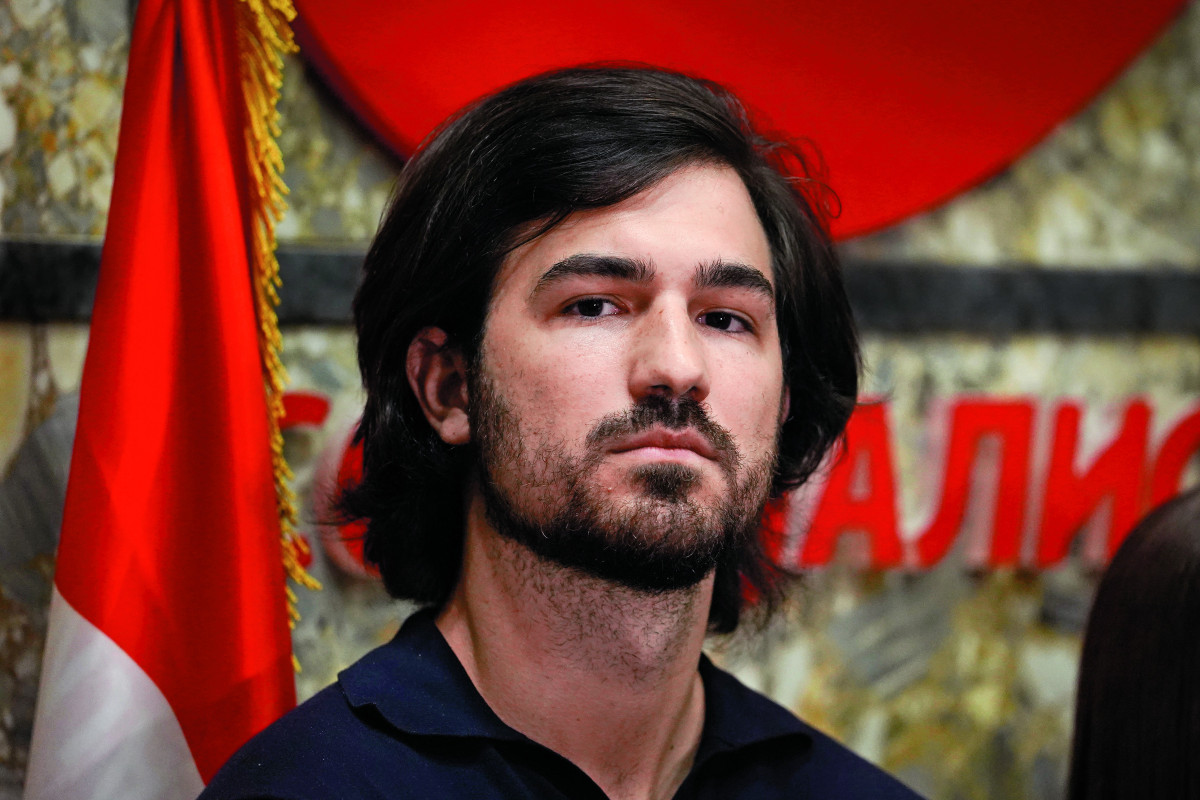
When he talked about remembering only the image of his grandfather, but not any conversation, Marko would say: “I was too young to remember that”. Several photos of them together, taken in The Hague, where he was given a large piece of blank paper on which he made a drawing that Milošević kept in his cell, and that is all. Everything he knows about his grandfather, he said, is what his mother had told him. During his school days in a small community, the notorious capital of the Milošević dynasty in the 1990’s, Marko says, there was malicious comments from his schoolmates about his grandfather and the politics he represented.
Nevertheless, his grandfather became his role model so just like him, he graduated from the Faculty of Law in Belgrade. The same Faculty which Ivan Stambolić also graduated from.
Marko has never talked about his studies, or his grandfather and father in more detail. He only said that he feels protective of his half-sister in Moscow, where, according to the Russian media, his father still likes fast driving, owns a Harley-Davidson and a Honda CBR600F, automobiles Audi A4 and Mitsubishi Lancer, and is a business partner of Igor Tarasenko, who makes money from public procurement and whose company Trade Motors doo provides vehicle maintenance services in the elite Moscow neighborhood of Odintsovo, where Vladimir Putin has one of his villas.
From there, allegedly, according to certain sources during Operation Sabre, Marko Milošević and some other tycoons financed the murder of Zoran Đinđić with five million dollars.
NIN has attempted to reach Marko Milošević Junior and hear his side of the story, but he did not respond to our calls and messages sent to his telephone number, which we received from the SPS.
Marko Milošević, according to the National Assembly website, lives in Požarevac, the birthplace of his grandparents. Zoran Milovanović, an activist of the Požarevac movement “Resistance” (“Otpor”), which opposed Milošević’s politics during the 1990’s, lives there as well. He still receives threats from “The Patriots of Serbia” (“Patrioti Srbije”), “The Serbian Liberation Front” (“Srpski oslobodilački front“), “The Patriotic Front of Serbia” („Patriotski front Srbije“)...
In the 1990’s, Milovanović filed criminal charges against Marko Milošević, the son of Slobodan Milošević. “What is the matter, you traitor, you scum?! You won’t be the first or the last that I cut up and hurl into the Morava River,” Milovanović cited Milošević in his statement.
“He put the chainsaw to my head, turned it on for a few seconds, then turned it off, placed it on top of the bar and told his men to take me away... I started crying.”
A former member of “Otpor”, today a member of the parliament and vice-president of the Democratic Party (DS) Srđan Milivojević, sits in the same Assembly hall as Marko Milošević.
“I don’t know what Marko Milošević has to do with those crimes. But we haven’t forgotten the sanctions, the hyperinflation, the murder of Ćuruvija, the assassination on the Ibar highway, the murder of Ivan Stambolić, the assassination in Budva, the string of unsolved murders of Zoran Todorović Kundak, Žika Petrović, the CEO of JAT, and we particularly haven’t forgotten the plight of our people during NATO aggression, nor the fact that in 1999 Milošević exchanged Visoki Dečani for “Bambiland‘, Gračanica for a house in Užička St., and turned the courtyard of the Peć Patriarchate into a parking lot for NATO tanks”, says Milivojević.
More than Marko Milošević, however, there are two other men who are a stronger reminder of that time and of Milošević - Vojislav Šešelj and Aleksandar Vučić. “After all“, he says, “in Italy, the granddaughter of Benito Mussolini was a member of the parliament. Nevertheless, imagine what would happen in Romania if someone announced that the grandson of Nicolae Ceausescu would sit in the Romanian parliament,” says Mlivojević.